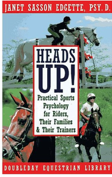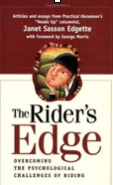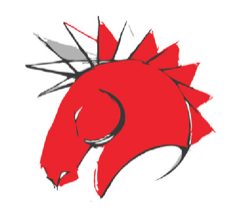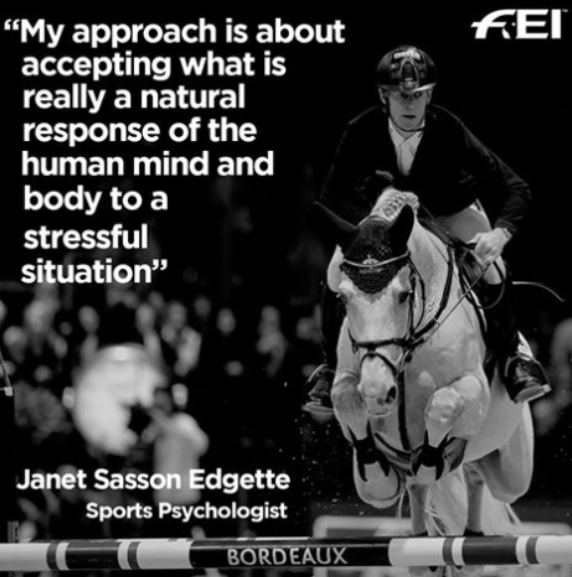
Dr. Janet Sasson Edgette
HUNTER/JUMPER • EQUITATION • EVENTING • DRESSAGE
412 Newcomen Road • Exton, PA 19341
610 | 363 | 1144 • [email protected]
Heads Up

Practical Sports Psychology for Riders, Their Families, and Their Trainers
The Riders Edge

Overcoming the Psychological Challenges of Riding
Advance your mental game with virtual or in-person sport psychology group clinics
Click here for information on clinic fees.
Suitable for:
Hunter/Jumper
Equitation
Eventing
Dressage
Adult Amateurs
Juniors
Parents of Juniors
Trainers/Professionals/Instructors
Topics:
Become an effective rider even though you have performance nerves
The dangers of trying to manufacture confidence
How to stop the self-critical voice inside your head
What to do if your anxiety turns you into too passive a rider
Become a more assertive rider without becoming aggressive
Not all riding skills are physical: Emotional intelligence and the elite rider
Parenting the high performance junior rider
Being the high performance junior rider
Perfectionism —friend or foe?
Dos and don’ts of getting over riding fears
And so very much more
I ADDRESS PERFORMANCE
- Horse show nerves
- Mental prep for the show ring
- Performance anxiety for lessons, clinics, riding other people’s horses
- Anxiety about getting, riding or ruining your new horse
I ADDRESS RELATIONSHIPS
- Rider – family relationships
- Encouraging good sportsmanship in a competitive environment
- Dealing with poor sportsmanship in youth or adult riders
- Riding with trainers who yell
- Pressure to do well because of the expense of this sport
- Balancing riding with family or work responsibilies
- Horse showing and family stress
- How your relationship with your horse affects your riding
- Losing horses you love
I ADDRESS CONFIDENCE
- The mental pressures of moving up divisions
- The mental pressures of qualifying for Finals
- Loss of confidence and how to rebuild
- The dangers of trying to manufacture false confidence
- What to do if you are feeling over-faced in your training
- Recovering from falls or injuries
- Fears of falling, getting hurt, being run off with, stops, crashes, missing distances
I ADDRESS ATTITUDE
- “Is this the right horse for me?“
- “Everything I say is wrong!” – horse show parenting
- Managing perfectionism
- Managing the pressures of your last junior year
- Remaining resilient through bad lessons, bad rounds, bad falls…
If you think equestrian sport psychology is just about relaxation and deep breathing and visualization, THINK AGAIN.
JANET’S APPROACH TO HELPING RIDERS IS DIFFERENT, AND HERE’S WHY:
Sport psychology is a lot more than just relaxation exercises, visualization, and positive thinking. Unfortunately, that’s all most people ever hear about, so when those strategies don’t work they feel stuck, with nowhere else to go.
My sport psychology approach differs from conventional sport psychology models, and has proved to be much more effective in helping riders manage the performance anxiety they experience at shows, clinics, or when riding other people’s horses. Instead of investing a lot of energy in trying to get rid of thoughts or feelings you don’t like, you learn how to ride well in spite of them. That way you’re not always looking over your shoulder to see if your nerves are catching up with you, and you don’t have to pretend to think or feel a certain way that you may not be thinking or feeling. By taking the “fight” out of anxiety management or your real fears of getting injured, and remaining very authentic and true to your real experience, you will be disempowering the anxiety you feel and empowering your own self.
From there, it’s easy to figure out how to compensate for the ways in which anxiety affects your riding. So, for example, if show nerves turn you into a passive, “second-guess-every-decision” kind of rider, then our job together will be discovering the best ways for you to quickly access and mobilize your more assertive, confident side. If show nerves turn your legs into a vice grip and your hands into steel, then our job becomes one of figuring out the thoughts or images that bring flexibility and softness into your body. These are things you can control. Making yourself “relax”—not so much.
Besides, who do you know who’s really relaxed at horse shows? The only ones I’ve ever known were the ones who got there by “accident”—they either were thrown into the ring on a strange horse at the last second or were riding under other unforeseen circumstances that made their expectations (and everyone else’s), well, soft. For the rest of us, once the outcome matters, everything changes, including and especially our anxiety levels. That’s just human nature. The funny thing about show nerves is that they’re only a problem if you think you shouldn’t be having them.
Who Is Sport Psychology For?
Equestrian sport psychology is for any rider who wants to be able to ride or perform at their best under conditions where they are feeling anxious or distracted, or have some type fear, such as that of getting hurt. Sport psychology is also helpful to riders who worry about making mistakes or ruining their new horse or someone else’s horse they’ve been asked to ride.
Riders have used my services to help them deal with the stress of training and showing, and even its impact on their family members or partners/spouses; many have wanted to talk about their relationships with their trainers, and find out how best to address issues that have come up in the course of working together. I’ve met with riders who were so upset after losing a favorite horse that they had trouble partnering with their new one, as well as with kids who were having trouble managing their frustration when not performing as well as they’d hoped.
I meet with amateurs, juniors, parents, instructors, trainers, recreational riders, and professionals riding up through World Cup and Olympic levels, and invite you to contact me with any questions you might have about how sport psychology can help you..
Can’t meet with me in person?
No problem!
My way of working with riders is well-suited to phone or online consultation. Here’s Why:
My way of working with riders is well-suited to phone or online consultation, since I don’t use conventional strategies such as relaxation, imagery, visualization, etc. which would require more of an in-person presence. Instead, I build conversations that help clients shift perspectives, embrace challenges as manageable even if un-welcomed, and/or learn to compensate for the ways in which their performance anxiety or fears compromise their riding.
Featured Articles

Sports Psychology: When Affirmations Aren’t Enough
MY APPROACH IS DIFFERENT
Read the FEI Interview HERE or click the above image.
Sport psychology is a lot more than just relaxation exercises, visualization, and positive thinking. Unfortunately, that’s all most people ever hear about, so when those strategies don’t work they feel stuck, with nowhere else to go.
My sport psychology approach differs from conventional sport psychology models, and has proved to be much more effective in helping riders manage the performance anxiety they experience at shows, clinics, or when riding other people’s horses. Instead of investing a lot of energy in trying to get rid of thoughts or feelings you don’t like, you learn how to ride well in spite of them. That way you’re not always looking over your shoulder to see if your nerves are catching up with you, and you don’t have to pretend to think or feel a certain way that you may not be thinking or feeling.
“I was brought up with a teacher named Gordon Wright who told us as teachers we had to be part psychiatrist. And he is a teacher that dealt with his pupils’ mental fears, especially the fear of making a mistake — which is what Janet deals with a great deal. In a very primitive crude way, I’ve always been aware of this field. Way, way, way back when I was a kid, I was aware of it, but now they refined it and made a science out of it and a real field out of it, and I think it’s a wonderful thing. Many people have been helped a great deal by Janet and people like Janet and I think that’s a big part of the sport and of life in the next century.”
Don't Wait Any Longer. Start Forging Your Own Path Today!
Contact Information:
Dr. Janet Sasson Edgette
412 Newcomen Road
Exton, PA 19341
Phone: 610 | 363 | 1144
Email: [email protected]

